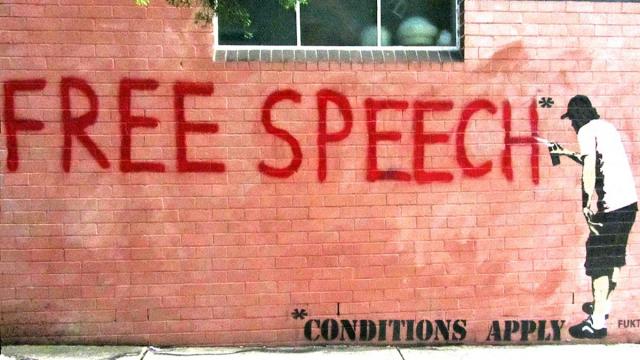
The internet is an ever-expanding battleground for freedom, liberty and privacy. The domain facilitates free expression and keeps power in check: from hacking and leaks, to expanding non-corporate digital journalism and creating places to network, build social justice momentum and share information. If you consider knowledge is power, the internet is a great leveller.
On the other hand, the web has a sinister side. It is a space where anyone with nefarious intentions can work, from terrorists to armed gangs to rogue states. Often using security threats as a justification to increase control, it is certainly a space where the establishment can increase its power. Both governments and corporations have unprecedented and increasing access to spy on users and clamp down political views that challenge the status quo.
Of course, the corporate media’s domination of news channels may have been dented by the internet. But their strength still remains an overriding force in society. Today, a developing new front in the battle over information is the rise of "censorship machines."
From Banned Books to Banned Content
Freedom of speech activists are dubbing new technologies censorship machines. These are complicated computer algorithms that can block certain content from being uploaded, or delete it altogether.
Internet censorship is hardly new. Looking at the pre-digital era, there has been a running battle between censors – whether states or religious authorities – and free-thinkers stretching back to ancient times, for instance in Rome (where the word "censor" originated), Greece and China. More recently, Thomas Paine’s book "Rights of Man" (1791) was banned in England, among the many other banned books in the Enlightenment era. Last century, seminal novels "Catch-22," by Joseph Heller, and "The Grapes of Wrath," by John Steinbeck, were illegal in some U.S. states.
Looking at the history of free speech, those whom the authorities have attempted to silence are typically small in number, for instance artists, novelists and speakers deemed subversive. But now the internet has enabled almost everyone to become a DIY publisher, with avenues like social media posts and blogs. The censorship machine attempts to shut down this new, almost universal freedom.
The Censorship Machine in Europe
The Legal Affairs Committee of the European Parliament is one focal point in this emerging conflict. The committee is currently drafting a Copyright Directive. Two contentious parts of the directive are content filtering and the snippet levy, also called the links tax.
Content filtering would mean that internet service providers would have a duty to police users so that they don't upload anything that infringes on a copyright. In effect, political memes that twist copyrighted imagery could be banned by an algorithm even before they see the light of cyberspace. Films could no longer be parodied or used for political purposes, where before these would have been protected under artistic licence and fair usage.
Again, this is machines – or algorithms – making the ultimate decisions, not people. For now. The legislation could also mean that educators would be denied access to swathes of potential teaching resources, currently exempted for academic purposes.
Digital freedom of speech advocates have criticised the new laws that would place the onus on internet providers to police what people upload. European Digital Rights (EDRi) an international rights advocacy organisation based in Brussels, point towards legal judgements made by the European Court of Justice. These have been found against individual member states for trying to push this legislation on a national level.
The other contested aspect of the proposed legislation is the snippet levy, which aims to charge websites that publish extracts of other news sites' material. As a pamphlet from EDRi explains, this could curtail the internet’s power as a social leveller, placing control back in the hands of the established and corporate class.
“The news will come exclusively from big publishers and companies who have enough negotiating power to contract the flow of the snippet levy revenues,” the pamphlet reads.
It's interesting to note that British citizens, currently embroiled in an uncertain departure from the EU, will not escape the censorship attack. In fact, Westminster has just "passed the most invasive surveillance law in democratic history," according to the London School of Economics, one of the country’s most prestigious institutions. The new Investigatory Powers Bill, dubbed the "Snoopers Charter," will enable unprecedented surveillance and the means to censor digital use.
Trump’s Censorship Plans
Looking to the U.S., Donald Trump’s new administration has plans to bring in a similar censorship machine. Fighting back, the campaign group "Stop the Censorship Machine" has cited communications from lobbyists of the music industry, big media and the Copyright Alliance. It says that the U.S. plans mirror what is happening in Europe by forcing internet service providers to police what is uploaded – using copyright as a way to deny freedom of speech and expression.
There are similar proposals under consideration for the link tax or snippets levy, or their equivalents, in the U.S.
As a result, organizations in the U.S. and Europe are building momentum against these moves, calling on supporters to take action. For example, in the U.S. people are being urged to write to the Copyright Office. Working in network with EDRi, 27 digital rights groups from across Europe have signed a letter against the new plans.
There are also growing calls for Europeans to lobby their appointed Members of European Parliament. In Europe this civic pressure and public campaign appears to moving the political needle. Digital freedom advocates have welcomed announcements from senior parliamentarians who are involved with the committee formulating the directive, including MEP Therese Comodini Cachia. While Cachia has stated that the E.U. will not push the worst excesses of the censorship machine, it remains too early to know the final details of the forthcoming legislation.
What is clear is that the fight for free speech will continue to escalate on the internet – apparent most recently in Tuesday's widely condemned vote in U.S. Congress, where Republicans repealed an Obama-era law that prevented giant internet service providers from buying and selling users' information without their consent or knowledge. In the days and months ahead, expect to see more fights that help shape, and reshape, privacy in the the digital world – and, by extension, in our society at large.
3 WAYS TO SHOW YOUR SUPPORT
- Log in to post comments












